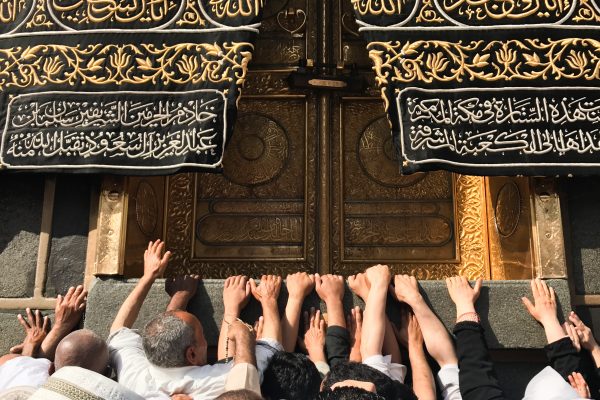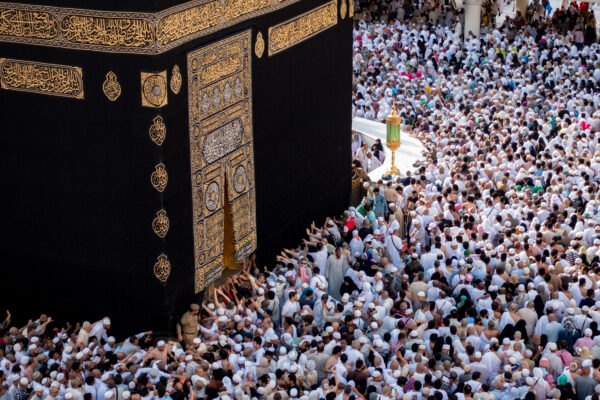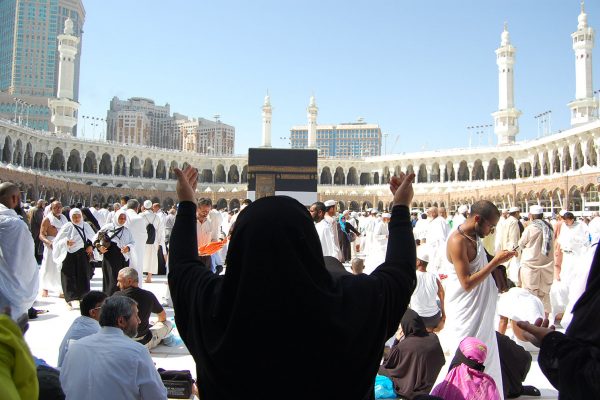It was only when attempting to write this article that I realised the impossibility of limiting the number of lessons that could be learnt from Hajj, and it is only due to reasons of brevity and my own shortcomings that I cannot continue this list into the dozens and hundreds as it deserves. Hajj is a very personal experience, and with it being so recent for me, I am sure that many of the lessons will only become apparent with time and experience. Of course, any faults or weaknesses in this article are only a reflection of my inadequacy, and all these lessons are universal – performing the Hajj should by no means be a prerequisite for reading this article.
1. Beauty in diversity
“And proclaim among men the Pilgrimage: they will come to you on foot and on every lean camel, coming from every remote path, that they may witness advantages for them and mention the name of Allah during stated days over what He has given them of the cattle quadrupeds, then eat of them and feed the distressed one, the needy” The Holy Qur’an 22:27
Even today, in a global village where we think we know about “every remote path”, Hajj exposes our ignorance about our fellow human beings. As the 6th Imam (as) said: “He (God) established the great annual convention of Muslims from the East and West (during Hajj) so that Muslims get to know each other well, and become aware of one another’s situations.” It is quite beautiful to see pilgrims adorned in different attires for worship to the same God, conversing in different languages but speaking to the same God, and engaging in different religious customs as their expressions towards the same God.
2. All are equal in the eyes of God
“O mankind, indeed We have created you from male and female and made you peoples and tribes that you may know one another. Indeed, the most noble of you in the sight of Allah is the most righteous of you. Indeed, Allah is Knowing and Acquainted.” The Holy Qur’an 49:13
After seeing the beauty of diversity, it is easy to fall into the trap of thinking your nation or tribe is superior to others. But then it is even more beautiful to see all of those same pilgrims dressed in the same white cloths, expressing the same “Labbayk” and walking around the same Ka’aba when the Hajj rituals begin. Any arrogance that was in your heart shatters like a pane of glass as you appreciate your similarity to the rest of creation.
3. There is always hope
A man in the Sacred Mosque asked Imam Sadiq (a.s): “Whose sin is greater than others?” The Imam (a.s) answered: “He who stays in Arafat and al-Muzdalifa, performs the Sa’y between Mount Safa and Mount Marwa, circumambulates the Ka’aba, performs prayer in the standing-place of Ibrahim, and after completing all these acts says to himself or has the impression that Allah has not forgiven him is the biggest sinner.”Al-Wafi; vol. 2 Section: Hajj p.42
The Day of Judgment is recreated at Arafat, with millions standing bareheaded in their death shrouds, humiliating themselves in the dust, unscented and unkempt in the scalding desert heat. Yet in this annual dress rehearsal for that event in which we will all be present, God decides to forgive attendees based solely on their attendance. When one reflects on the merciful nature of this God, it warms the heart and reassures us that regardless of our transgressions and sins, God is always ready to accept us into His arms once again. As Imam Sadiq (as) instructs, “renew your covenant with Allah (swt)” in Arafat.
4. Rid yourself of vices
“The pilgrimage is (performed in) the well-known months; so whoever determines the performance of the pilgrimage therein, there shall be no intercourse nor wickedness nor quarrelling amongst one another” The Holy Qur’an 2:197
It is quite remarkable that of the 25 forbidden acts in the state of Ihram, two of the three mentioned in the Qur’an are actually haram beyond the Ihram period: fusooq (wickedness, including the use of foul and abusive language) and jidaal (quarreling). These are also two of the most difficult acts to refrain from, especially during the Hajj where millions of pilgrims with different languages and cultural norms are picked from all corners of the world and placed together in a hot and barren land. Once the skills of restraint have been learnt, and all other vices thrown back at the Shaytan in the form of pebbles, the challenge is to start afresh on the pilgrim’s return to normal society.
5. Care for God’s creation
“And when Ibrahim said: My Lord, make it a secure town and provide its people with fruits, such of them as believe in Allah and the last day.” The Holy Qur’an 2:121
The Abrahamic prayer for the land of Makkah was two-fold: for security and for the provision of fruits. The prayer was granted, and to this day, the security of the Haram area is preserved – not a tree can be uprooted nor an animal hunted within the sacred sanctuary (“O you who believe! do not kill game while you are on pilgrimage” Holy Qur’an 5:95). In fact, not even an insect found on the body can be killed! It is a shame to see the sanctity towards animals and plants afforded by God in His home, in contrast to the reckless attitude we often demonstrate in our homes, seen most aptly in our daily lives as wastage of food and resources.
6. Stop and reflect
“So when you hasten on from “‘Arafāt”, then remember Allah near the Mashār al- Harām, and remember Him as He has guided you, though before that you were certainly of the erring ones.” The Holy Qur’an, 2:198
Hajj is filled with stops, where the pilgrim isn’t obliged to do anything but pause at a particular place for an allocated time. The stop at Mashar-al-Haram (Muzdalifa) is particularly poignant – all distractions, be they the bright lights of a city, the hustle and bustle of inner city traffic or even the distant hums of electrical appliances, are all silenced. All that can be seen is the night sky in its beauty, and all that can be heard is the buzz of remembrance of God. Sometimes, we need to escape from our familiar routines, put our gadgets and contraptions to one side and marvel at God’s creation. “Those who … reflect on the creation of the heavens and the earth: Our Lord! Thou hast not created this in vain!” The Holy Qur’an 3:191
7. Strive for success
“Surely, the Safa and the Marwa are among the signs appointed by Allah.” The Holy Qur’an; 2:158
Despite seeming like solely a preparation for the hereafter, Hajj also teaches lessons for this world. Hajar ran between Safa and Marwah desperately seeking water in a barren desert – despite the slimmest of possibilities, she strived until God rewarded her with the results. As Hajar fought so much for a material livelihood for her young child, Hajj teaches us to strike the perfect balance: strive for success in this world, but do not attach yourself to the worldly pleasures. “Work for the world as if you were going to live forever, and work for the hereafter as if you are going to die tomorrow.” Imam Ali (as), also attributed to Imam Kadhim (as)





